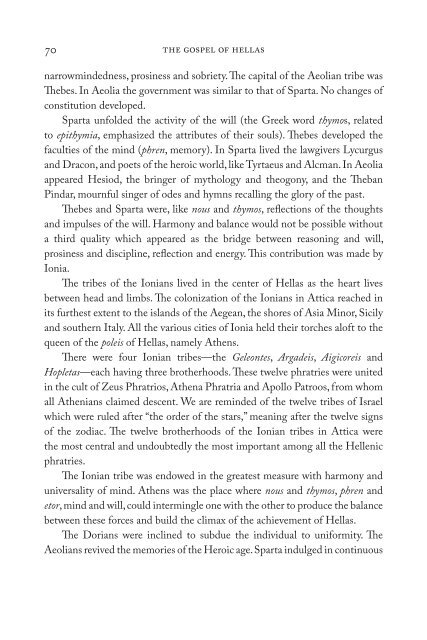The Gospel of Hellas - Research Institute for Waldorf Education
The Gospel of Hellas - Research Institute for Waldorf Education
The Gospel of Hellas - Research Institute for Waldorf Education
You also want an ePaper? Increase the reach of your titles
YUMPU automatically turns print PDFs into web optimized ePapers that Google loves.
0 the gospel <strong>of</strong> hellas<br />
narrowmindedness, prosiness and sobriety. <strong>The</strong> capital <strong>of</strong> the Aeolian tribe was<br />
<strong>The</strong>bes. In Aeolia the government was similar to that <strong>of</strong> Sparta. No changes <strong>of</strong><br />
constitution developed.<br />
Sparta unfolded the activity <strong>of</strong> the will (the Greek word thymos, related<br />
to epithymia, emphasized the attributes <strong>of</strong> their souls). <strong>The</strong>bes developed the<br />
faculties <strong>of</strong> the mind (phren, memory). In Sparta lived the lawgivers Lycurgus<br />
and Dracon, and poets <strong>of</strong> the heroic world, like Tyrtaeus and Alcman. In Aeolia<br />
appeared Hesiod, the bringer <strong>of</strong> mythology and theogony, and the <strong>The</strong>ban<br />
Pindar, mournful singer <strong>of</strong> odes and hymns recalling the glory <strong>of</strong> the past.<br />
<strong>The</strong>bes and Sparta were, like nous and thymos, reflections <strong>of</strong> the thoughts<br />
and impulses <strong>of</strong> the will. Harmony and balance would not be possible without<br />
a third quality which appeared as the bridge between reasoning and will,<br />
prosiness and discipline, reflection and energy. This contribution was made by<br />
Ionia.<br />
<strong>The</strong> tribes <strong>of</strong> the Ionians lived in the center <strong>of</strong> <strong>Hellas</strong> as the heart lives<br />
between head and limbs. <strong>The</strong> colonization <strong>of</strong> the Ionians in Attica reached in<br />
its furthest extent to the islands <strong>of</strong> the Aegean, the shores <strong>of</strong> Asia Minor, Sicily<br />
and southern Italy. All the various cities <strong>of</strong> Ionia held their torches al<strong>of</strong>t to the<br />
queen <strong>of</strong> the poleis <strong>of</strong> <strong>Hellas</strong>, namely Athens.<br />
<strong>The</strong>re were four Ionian tribes—the Geleontes, Argadeis, Aigicoreis and<br />
Hopletas—each having three brotherhoods. <strong>The</strong>se twelve phratries were united<br />
in the cult <strong>of</strong> Zeus Phratrios, Athena Phratria and Apollo Patroos, from whom<br />
all Athenians claimed descent. We are reminded <strong>of</strong> the twelve tribes <strong>of</strong> Israel<br />
which were ruled after “the order <strong>of</strong> the stars,” meaning after the twelve signs<br />
<strong>of</strong> the zodiac. <strong>The</strong> twelve brotherhoods <strong>of</strong> the Ionian tribes in Attica were<br />
the most central and undoubtedly the most important among all the Hellenic<br />
phratries.<br />
<strong>The</strong> Ionian tribe was endowed in the greatest measure with harmony and<br />
universality <strong>of</strong> mind. Athens was the place where nous and thymos, phren and<br />
etor, mind and will, could intermingle one with the other to produce the balance<br />
between these <strong>for</strong>ces and build the climax <strong>of</strong> the achievement <strong>of</strong> <strong>Hellas</strong>.<br />
<strong>The</strong> Dorians were inclined to subdue the individual to uni<strong>for</strong>mity. <strong>The</strong><br />
Aeolians revived the memories <strong>of</strong> the Heroic age. Sparta indulged in continuous

















